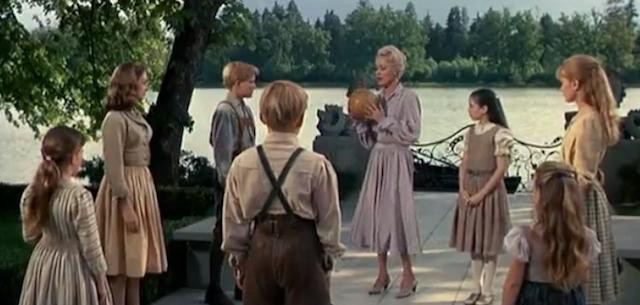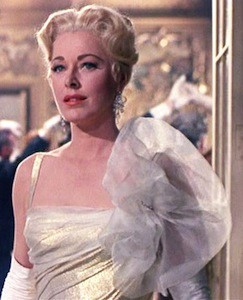“What” a Note to Follow “So”: Why I Am the Baroness
by Leigh Bardugo

I’m afraid of babies. I fear babies for a lot of reasons — I’m an only child with a meager extended family; I never babysat in my neighborhood; I was raised by a single mother who was more likely to take me to a dinner party full of adults than an afternoon playdate. This wouldn’t be an issue if people weren’t always trying to hand me their infants. There’s simply an expectation that, if a female of a certain age has her hands free, she wants someone to fill them up with newborn, when really, in my case, a vodka tonic and a plate of sandwiches would be much preferred.
I could blame gender norms or my propensity for earth mother maxi dresses and chunky jewelry, but the real problem is Julie Andrews.
I know that for most people, Mary Poppins and The Sound of Music are beloved childhood staples. For me, they were baffling. I ran wild as a kid. I played in the hills behind our house that were overrun with coyotes. I had free access to my grandfather’s woodshop where I nearly took a finger off with a round saw. My friends and I were once chased down the street by a man who emerged from the L.A. River with handcuffs dangling from one wrist.
Little House on the Prairie I understood. That was the frontier. People had responsibilities and bad things happened. Fires. Floods. Dead animals. A Little Princess? Sure. I had chores, and possibly an early on-set garret fetish. But the children of Mary Poppins and The Sound of Music were beyond me. Who were these apple-cheeked tots who didn’t appreciate their nice clothes and couldn’t fix a kite?
Remember the Baroness? She was Julie Andrews’ would-be rival for Captain Von Trapp’s attentions — portrayed, with a practiced cool, by Eleanor Parker. She was very blond, impeccably dressed, and not particularly nice to “the help.” These were all indications to the audience that we weren’t supposed to root for her.
But the real proof of the Baroness’ villain status was the fact that the von Trapp children didn’t like her. Even if the Captain couldn’t see through her title and fancy manners, his kids knew what was up.
I recently went to a Sound of Music sing-along at a theater in Hollywood. People danced, dressed up in costume, threw things at the screen. All very Rocky Horror. Now, if you had to guess who gets the most boos and hisses in a movie that involves Nazis, your best guess would probably be, you know, Nazis. But you’d be wrong. The Baroness got more boos than Rolf and all his goose-stepping friends.
Sitting in that theater, still reeling from a rousing rendition of “The Lonely Goatherd” performed by a gentleman in leather lederhosen hotpants with a genuinely competent yodel, I finally realized why babies and children make me nervous.
If someone’s dog barks at you at a party, the owner apologizes and says something like, “I don’t know what’s gotten into him,” or, “He’s a rescue poodle.” The other guests shrug and smile, but they give you a wider berth in the buffet line. After all, anyone who watches movies or television knows that dogs sense evil the way they sense natural disasters. You might just be an awkward partygoer. You might also be an earthquake or the Terminator.
It’s even worse with babies and little kids. People believe children have some kind of innate sense of good and evil. So now, you’re at another party (the dog incident has finally been forgotten, and you’re starting to get invited places again), and someone’s new infant is being passed like a cooing baton from guest to enraptured guest. It’s not like a dog. You can’t say, “Oh no, I’d love to, but these dang allergies.”
Nervously, you take him into your arms. You try to smile and embody soothing confidence, and for a moment, you think you may actually survive this social rodeo without getting bucked. His sleepy eyes widen. He blows a spit bubble. And then he zeroes in like a cardshark reading your tells. You sense the change but you are powerless to stop it. He starts to wail.
His mother’s brow furrows. “I don’t know what’s gotten into him,” she says. “He never ever cries.” And everyone stares at you, surprised to see that even monsters shop at Old Navy.
Don’t get me wrong. I understand the appeal of a movie like The Sound of Music. (What’s not to love about an impressionable girl marrying a widower several years her senior so that she can care for his seven children by another woman? I mean, that’s the stuff of which romance is made.)

The problem is that I’m more like the Baroness than Maria.
The Baroness dyes her hair. I dye my hair.
The Baroness is more at home sipping drinks on the terrace than hiking through those lively hills. I, too, hate camping.
The Baroness is frosty and elitist. But wouldn’t anyone seem a little finicky next to our perpetually sunny Maria? Maybe the Baroness’ chilly demeanor is just a defense mechanism for a bit of shyness, a bad case of insecurity stemming from an aristocratic childhood spent playing second fiddle to her father’s polo ponies or a failed first marriage to a handsome but degenerate playboy. You don’t know her life.
This woman puts a lot of time into Captain von Trapp. She likes him. She thinks he likes her. She knows his kids don’t, but she’s hoping she can win them over. Maybe teach Liesl how to wax her lip or something. And then this virginal, fresh from the nunnery, guitar-toting, problem-named-Maria shows up on her doorstep sporting an androgynous yet weirdly flattering haircut, ready to lead the wee von Trapp demons in multi-part harmony.
The worst part is that the Baroness really does make an effort. She tries to play ball with the young von Trapps. She praises their singing (not as effusively as they’d like, but who’s being demanding now?). And don’t forget that when the Baroness loses the Captain, she does so gracefully. It’s clear she’s hurt and probably a bit humiliated, but she doesn’t turn nasty or cause a scene. She and von Trapp part as friends. Yet this dignified exit didn’t carry much weight with the audience in that Hollywood theater.
The Baroness has baggage. She’s complex, a work-in-progress. She’s like us. Maria is… well, a bit of a Maria Sue (see also Munich Pixie Dream Girl). But despite this and despite the poise and generosity with which the Baroness leaves the screen, she is, in the end, less a woman wronged than a rival to be vanquished — because the von Trapp children have already given us our cue.
It isn’t surprising that whenever someone holds a baby out to me, I feel paralyzed by anxiety. The Baroness suffered so that we might learn: Once the kids decide they don’t like you — that you aren’t capable enough or kind enough or wise enough — forget it. The dog has barked. The scales have been sung. I recommend feigning an arm cramp and keeping your hands gloriously free. The better to enjoy a stiff drink with jam and bread.
Leigh Bardugo was born in Jerusalem, grew up in Los Angeles, and graduated from Yale University. These days, she hides out in Hollywood, where she indulges her fondness for glamour, ghouls, and costuming in her other life as a makeup artist. Her first novel, Shadow and Bone, was a New York Times bestseller, and her second, Siege and Storm, is out today.